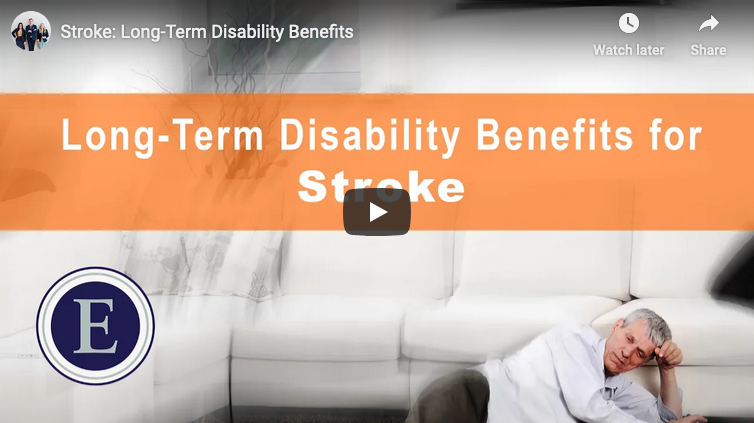Do I Qualify for Long-Term Disability Benefits if I Have Multiple Sclerosis?
Can I Get Long-Term Disability Benefits for Multiple Sclerosis?
One of the most common questions we get is “Do I qualify for long-term disability benefits if I have Multiple Sclerosis?”
Multiple Sclerosis (MS), is a disease of the central nervous system that causes damage to nerves, cognitive problems, widespread pain and fatigue and can have a significant impact on a person’s employment and daily life.
Therefore, Multiple Sclerosis can qualify for long-term disability benefits – provided it is not excluded by your insurance policy wording.
LTD Denied? Which Category Do You Fit In?
Category 1: The insurance company denied your initial claim for disability benefits for Multiple Sclerosis.
Category 2: The insurance company denied your appeal.
Category 3: The insurance company discontinued or terminated your benefits.
What Can We Do For You?
We’ll work with you and your physician to help challenge the insurance company’s denial or discontinuance of your long-term disability benefits.
Where necessary, we will engage other trusted professionals to support your case including specialists, functional capacity evaluators, and vocational evaluators to help credibly explain why your disability symptoms are preventing you from doing your “own occupation” or “any occupation”.
Our Help Can Make All The Difference. How?
- Over 25 years’ combined experience getting our clients the benefits they deserve.
- Expertise in both disability and employment law (your employment status is directly linked with your disability)
- We offer a free case assessment
- We offer flexible rates, including contingency fees (i.e., only pay if you win)
- Service across all of Ontario
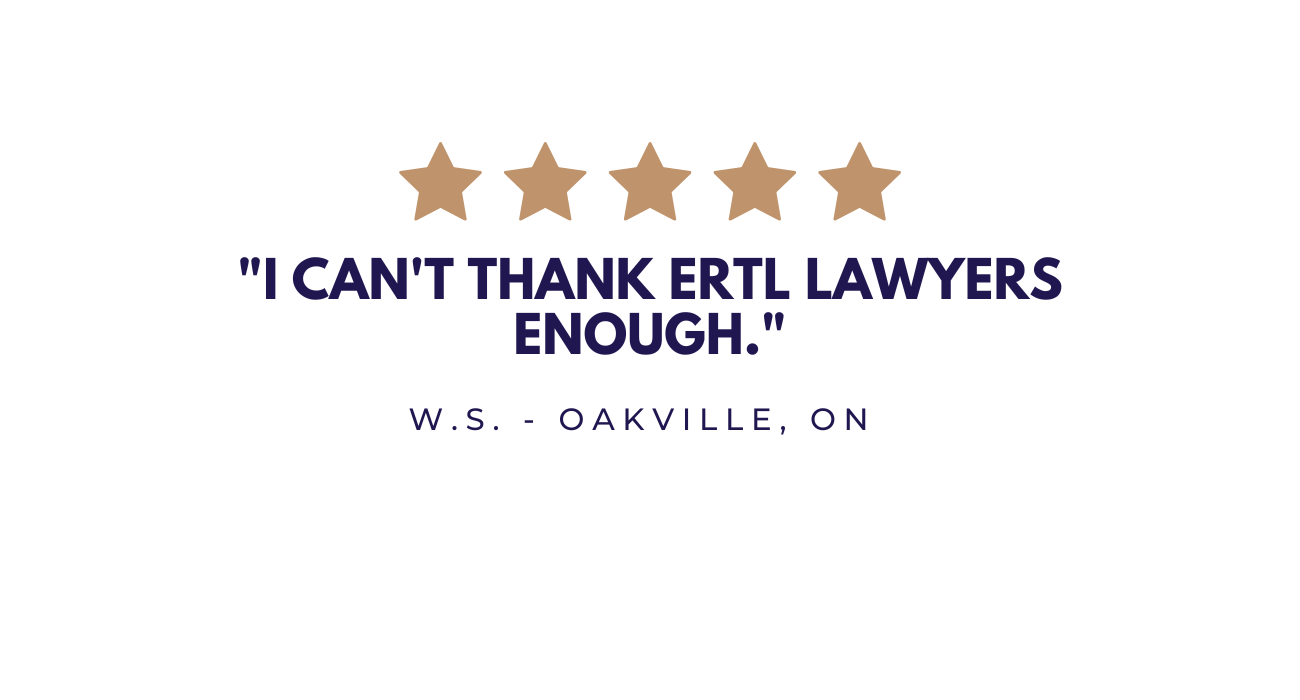

Multiple Sclerosis: Overview
Multiple Sclerosis is a chronic brain disease that attacks nerve fibers and tissues within your nervous system, causing communicative issues throughout your body.
Those who suffer from Multiple Sclerosis may experience numbness or weakness in their limbs, vision loss, and cognitive impairment.
Multiple Sclerosis is considered an immune-mediated disease, in which the immune system abnormally attacks myelin, the protective layer around the nerves.
This eventually leads to the deterioration of the central nervous system.[1]
The cause of Multiple Sclerosis is unidentified, though risk factors include:
- Genetics
- Environment
- Prior infection
- Gender (more common in women)
- Obesity
- Smoking
In some cases, Multiple Sclerosis presents with no apparent cause.
Intensity of the symptoms is extremely variable, the amount of nerve damage often determining the severity of the person’s symptoms. Though there is no cure, medications can reduce symptoms in some patients.
Multiple Sclerosis research is somewhat inconsistent, but the disease can be linked to other painful conditions, such as
- Irritable Bowel Syndrome (IBS)
- Bullous Pemphigoid (BP)
- Uveitis [2]
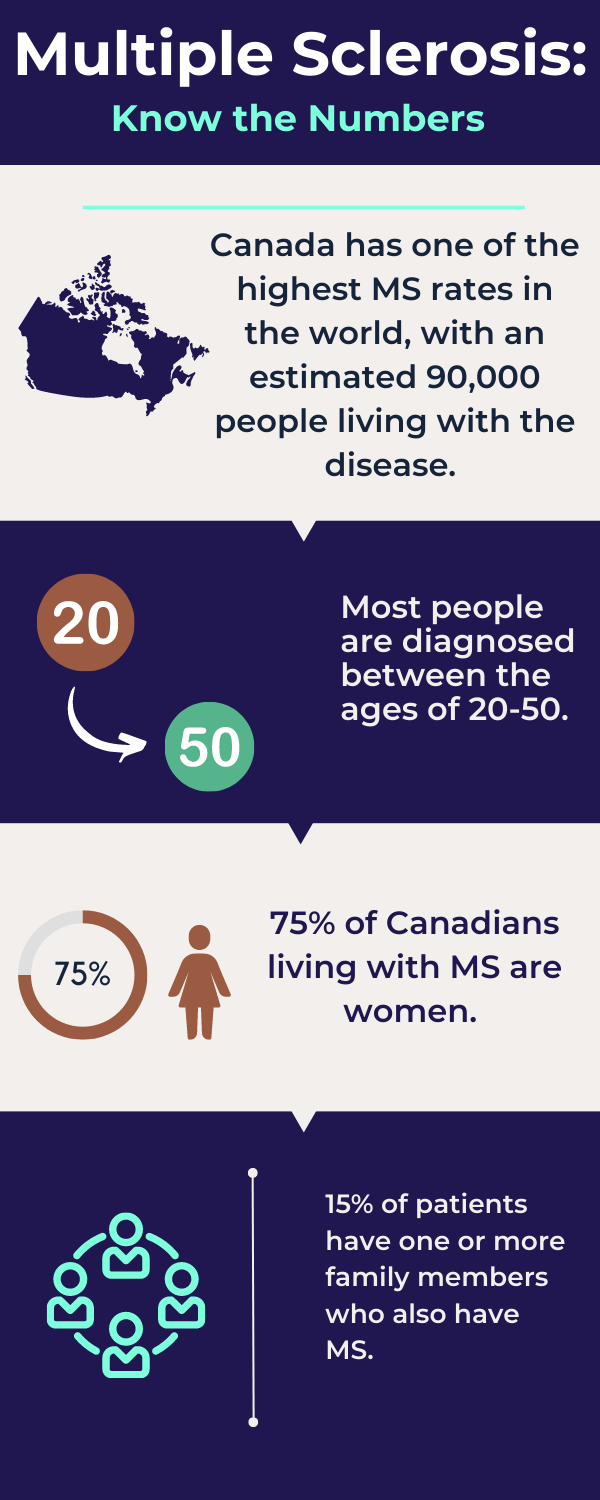
Most Common Symptoms of Multiple Sclerosis
Multiple Sclerosis is mainly associated with:
Fatigue: the fatigue is usually strong, often to the point of exhaustion, resulting in decreased endurance and a limited ability to function physically and mentally.
Cognitive difficulties: Memory, concentration, and attention are impaired, particularly when exhaustion is most intense.
MS hug (Dysesthesia): early symptom of MS, a tight sensation around stomach or chest. Duration of the sensation varies.[3]
Other symptoms can include:
- Dizziness
- Bladder Dysfunction
- Bowel dysfunction
- Fatigue
- Pain/Weakness
- headaches / migraines
- Gait (difficult to walk)
- Hormonal imbalances for women with MS
- Difficulty speaking
- Sensory Impairment
- Uhthoff’s phenomenon (heat sensitivity) [5]
Important: Many people with Multiple Sclerosis become discouraged, which can lead to depression and anxiety.
Criteria for a Diagnosis of Multiple Sclerosis
There is no single test to confirm if you have Multiple Sclerosis. Doctors have to rule out other conditions to make a diagnosis, but there are now several strategies, including spinal fluid analysis, blood tests and neurologic exams used to identify and manage the condition.
The main diagnostic criteria using the Canadian guidelines are:
- Evidence of damage in two different areas of the nervous system.
- Evidence that the damages occurred at separate times
- Rule out other conditions
Because a Multiple Sclerosis diagnosis is based, to a large extent, on self-reported symptoms, long-term disability insurers often deny these claims.
Treatment for Multiple Sclerosis
There is no cure for Multiple Sclerosis, however symptoms can be treated with both medication-based and therapy-based treatments.
Medication
Medications (e.g., painkillers, corticosteroids, plasma therapy) will likely be required for most patients but can be expected to provide only modest symptom relief. [1]
Therapy
As each case of Multiple Sclerosis is difference from another, therapies such as the following may or may not help any particular person with Multiple Sclerosis:
- cognitive behavioural therapy
- psychotherapy
- massage therapy
- acupuncture
- biofeedback
- chiropractic
- homeopathy
- hypnotherapy
- mental imaging
- naturopathy
- osteopathy
Surgery
Surgery is available for Multiple Sclerosis patients, including:
- Deep brain stimulation
- Opening blood flow
- Intrathecal baclofen pump therapy
- Rhizotomy

Multiple Sclerosis & Your Employment
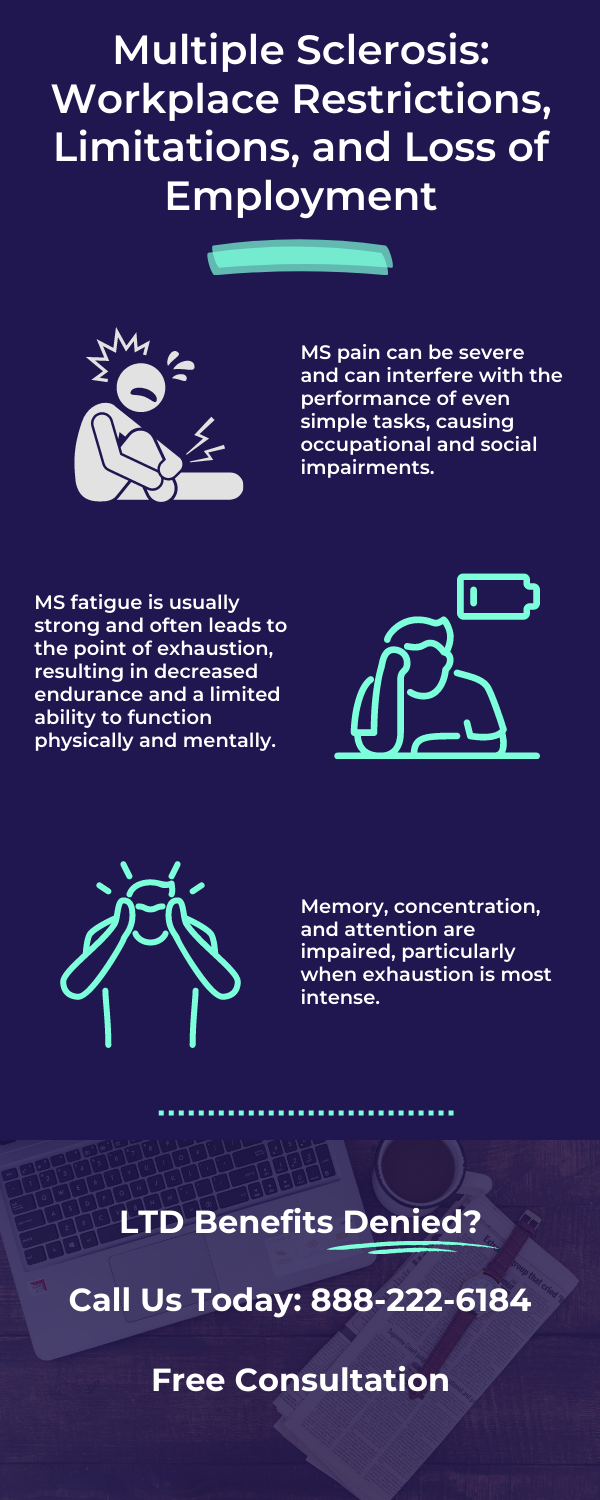
Workplace Restrictions Caused by Multiple Sclerosis
When considering your employment and Multiple Sclerosis diagnosis, consider how stable your condition is, how safe you are to do your job and what the demands are physically and mentally.
Many individuals suffering from Multiple Sclerosis may experience fatigue and lack of strength, or muscle pain.
Multiple Sclerosis and Workplace Discrimination
It is unlawful to discriminate against someone in the area of employment based on their physical disability: Ontario’s Human Rights Code and the Canadian Human Rights Act.
If you are suffering from Multiple Sclerosis, you might face discrimination in a variety of ways:
- You experience employment termination because you have Multiple Sclerosis.
- You are denied accommodation because of your Multiple Sclerosis.
- After returning from a disability leave, your employer places you in a lower, part-time position at a lower rate of pay.
- Someone makes unwelcome remarks or jokes about your disability.
- Someone offends or humiliates you physically or verbally threatens or intimidates you because of your disability.
- Retaliating against you for filing a human rights complaint.
Ertl Lawyers are experts in Employment and Disability Law. If you have been discriminated against, our disability and employment lawyers in Toronto can help, including:
- Having your employer comply with their duty to accommodate you.
- Having your employer stop all forms of discriminatory conduct.
- Representing you in wrongful dismissal in Ontario, constructive dismissal, and human rights matters.
- Ensuring that your employer complies with its statutory obligations, including its obligations under the Employment Standards Act.
- Negotiation severance packages (including continuation of benefits).

Multiple Sclerosis & Insurance Companies
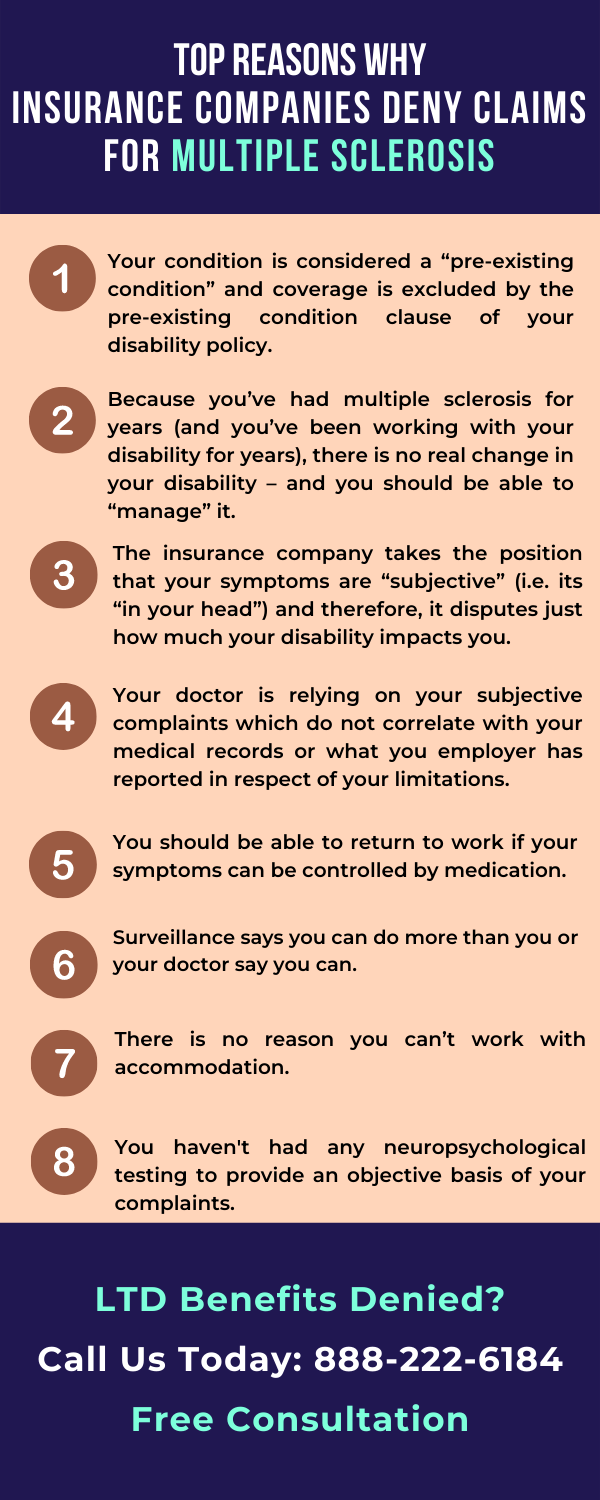
Applying for Long-Term Disability Benefits for Multiple Sclerosis?
Review Your Policy Carefully
Your entitlement to long-term disability benefits for Multiple Sclerosis depends on the specific wording of your disability policy.
As noted, some policies outright exclude Multiple Sclerosis coverage or else consider it a “mental disorder” (and seek to limit the amount of benefits).
It is important that you understand how the insurance company defines things like “totally disabled,” “occupation,” “mental disorder, “self-reported condition” – and whether any exclusions apply (particularly for pre-existing conditions).
Bottom line: You need to know what your policy says before you apply for benefits.
Gather Medical Evidence
To be entitled to long-term disability benefits for Multiple Sclerosis, every insurer requires you to provide medical evidence documenting your diagnosis and that your illness or injury causes restrictions or lack of ability, such that you are prevented from performing the essential duties of your occupation.
It is recommended that you get treated by a medical professional (particularly a neurologist) who will diagnose your condition using established criteria.
It is also recommended that you provide to the insurer results of any Functional Capacity Evaluation or cognitive testing that objectively documents your physical and (if applicable) mental limitations.
Gather Evidence of Workplace Limitations
Because your entitlement to long-term disability benefits for Multiple Sclerosis depends on the strength of your evidence, you should get a copy of your employee file from work. It may show that your Multiple Sclerosis has negatively impacted your work performance. Your work performance may have been affected by your pain, fatigue, cognitive impairment, or other symptoms.
Create a List of the Physical Duties of Your Job
You should get a copy of your job description. Based on that job description, you should write out a detailed list of the physical (and mental) duties associated with your job description – and explain how your Multiple Sclerosis limits or prevents you from performing you own occupation.
Follow Your Doctor’s Treatment Plan
Your entitlement to long-term disability benefits also requires you to be receiving regular, ongoing care and treatment for your Multiple Sclerosis. In other words, don’t skip appointments, and always follow your doctor’s treatment plans.
Keep a Pain / Symptom Diary
On your end, it is important to keep a pain diary. A pain diary is a written record that helps you keep track of when you have pain, how bad it is, and whether your treatment is helping.
What Other Benefits Might I Be Entitled to for Multiple Sclerosis?
Other than short-term and long-term disability benefits through a group or individual insurance plan, people suffering from Parkinson’s disease might be entitled to one or more of the following benefits:
- Employment Insurance (EI) Sickness Benefits;
- Ontario Disability Support Plan (ODSP);
- Disability Tax Credit (DTC);
- Disability Creditor Insurance (under your mortgage or credit cards);
- Trillium (extended health benefits);
- Canada Pension Plan Disability (CPP-D); and
- Disability Pension (employer).
Organizations / Associations / Colleges
- MS Society of Canada
- National Multiple Sclerosis Society
- Multiple Sclerosis Association of America (MSAA)
- Myelin Repair Foundation
- Multiple Sclerosis Foundation (MS Focus)
Disclaimer: The content on this web site is provided for general information purposes only and does not constitute legal, medical, or other professional advice or an opinion of any kind. Users of this web site are advised to seek specific legal advice by contacting members of Ertl Lawyers (or their own legal counsel) regarding any specific legal issues. Ertl Lawyers does not warrant or guarantee the quality, accuracy or completeness of any information on this web site
Sources:
[1] https://www.mayoclinic.org/diseases-conditions/multiple-sclerosis/symptoms-causes/syc-20350269
[2] https://www.doctorrowe.com/common-co-existence-of-other-ailments-with-multiple-sclerosis-ms/
[3] https://www.nationalmssociety.org/Symptoms-Diagnosis/MS-Symptoms/MS-Hug-(Dysesthesia)
[4] https://www.healthline.com/health/multiple-sclerosis/surgery#surgery-and-risk-for-ms-flares
[5] https://mssociety.ca/about-ms/symptoms
Long-Term Disability Benefits Denied?
Ertl Lawyers provides expert representation in long-term disability matters.
The vast majority of disability matters are resolved through negotiation and mediation – and that’s because insurance companies know that we are passionate about our clients’ rights.
How we can help you:
• free disability policy analysis
• free case assessment
• applying for disability benefits
• appealing a denial or termination of your benefits
• disputing a denial through a legal claim
• handling all communications with your employer
• protecting your employment
• prosecuting human rights claims
Fair, Flexible Rates – Including Contingency Fees
(Don’t Pay Unless You Win)
Our Help Can Make All The Difference.
Related Blogs
Understanding the Duty to Accommodate Laws in Canada
Laws regarding duty to accommodate aim to level the playing field in situations that inherently discriminate against individuals based on factors they cannot control, and which are protected in various Canadian statutes. These protected (or prohibited) factors usually...
What Qualifies for Long-Term Disability in Canada?
Long-term disability (LTD) benefits are paid out by insurance companies according to the policy purchased by a worker, their union/association or their employer, and each has specific rules regarding how you qualify for long-term disability benefits. The general rule...
How to Apply for Long-Term Disability
One of the many things the COVID-19 pandemic made crystal clear, if it wasn't already, is that our health is often out of our control. Be it mental or physical, illnesses and injuries are mostly unexpected and can completely disrupt our lives, especially conditions...




